As a human being, anger is a part of our mind. Irritation also part of our mind. But you can do – anger come, go. Never keep in your sort of – your inner world, then create a lot of suspicion, a lot of distrust, a lot of negative things, more worry. – Dalai Lama
Irritation is an emotion that accompanies us in many situations, a constant, low-level anger that feels like an itch we want to scratch. Daily life is full of frustrations that inspire this feeling: from that person walking slowly in front of you to that traffic jam that has kept you in place for fifteen minutes. But being always irritated is not very pleasant. It makes us feel tired and frustrated. It can wear down our bodies and minds, not to mention our spirits. But how can you overcome an emotion that can feel so natural? Let’s see the strategies to use.
Center the positive
That old cliché about trying to find the silver lining in every cloud is tiresome, but that doesn’t mean it’s not true. However, it doesn’t need to be corny. Make it into a game. Try to find a way to turn most situations into something a bit more tolerable by considering the positives they bring. Challenge your mind to come up with at least one advantage to the situation or find an element to enjoy.
Sure, you’re stuck in traffic. What is positive about that? Can you find a way to enjoy an element of it? Maybe you are listening to a fun podcast or to music you like (and if not, why not turn something on?) or get a chance to breathe for a little. Center the positive.
Focus on what is happening now, not on the past or the future
Our irritation is often nurtured by thoughts of the past, the future, or just fantasies. When you are waiting in line, you are often frustrated because you are thinking about what you could be doing instead, worrying about what you will do when you finally leave the store, or remembering that awkward conversation you had with a colleague. That adds to your irritation.
Instead, focus on the present. What is happening now? How bad is it? Is it truly worth getting angry about? Take a moment to examine your feelings, sensations, and current experience. Focus your attention, gently, on the here and now. You might find that it helps your emotional state.
Look at the bigger picture
How big of an impact does the situation have on your life? Usually, irritation arises when we are faced with minor inconveniences. If we respond as if the world was turning on us each time, we will get disproportionately angry and wear down our bodies and minds.
Learn to look at the bigger picture and let go of the small problems. If something is not worth your time and attention, it’s not worth getting angry about it either or carrying it with you throughout the day.
Laugh a little
Find the humor in the situation and don’t take it (or yourself) too seriously. Often, our irritation comes because we worry too much or feel concerned about how we appear.
A little laughter, a smile, or an inner reminder that things are not as serious as they seem could be nice and have a positive effect on your irritation. It’s hard to be angry and have fun at the same time. Sure, you might not always be able to find the funny side, but if you set this intention, it will come easier over time.
Make life a bit easier
A useful tip to manage irritation is to pay attention to your body and make life easier. Sometimes, we get more annoyed because we are hungry, hot or cold, thirsty, or have another thing that’s bothering us.
When you feel irritation, ask what’s going on and pay attention to your body. Is something causing you discomfort? Is there a way to alleviate this discomfort? If not, just acknowledge it and try to do something about it as soon as you can. Often, irritation is tied to the fact that you’re carrying something heavy or need a drink, not just to the situation. On a broader scale, try to sleep better and eat better, as these practices will likely make you less prone to feeling irritated when the situation doesn’t merit it.


